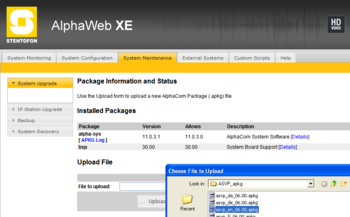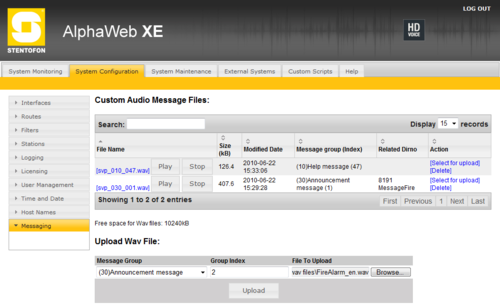Audio Messaging
From Zenitel Wiki

The Audio Messaging features are used to provide various messaging services and PA broadcast in the ICX-AlphaCom and the AlphaCom XE. The messages are stored in flash memory, and can be played back to individual stations or to a group of stations to give information like:
- Voice guidance at doors and elevators
- Security voice response
- Auto-attendant and voice guidance
- Information messages
- Alarm and evacuation messages
There are four ways to implement audio messaging services:
- ASVP software module
- Upload customized wav-files from AlphaWeb
- Record customized messages from an intercom station
- ASVP board (AlphaCom servers only)
ASVP = AlphaCom Stored Voice Playback
ASVP Software Module
A set of standard audio messaging services can be implemented by uploading a language package file to the server using the web interface. The standard messages consist of:
- Absence messages
- Information messages
- Help messages
- Alarm messages
Which type of messages that actually becomes available depends on what Audio Messaging license is installed.
The language file has the format asvp_xx_06.00.apkg, were xx is the actual language, and 06.00 is the version number. Available language packages:
da Danish de German en English fi Finnish fr French it Italian ko Korean no Norwegian sv Swedish chn Chinese nl Dutch

Before the installation can start, you need to download the language file from Zenitel Wiki to your PC.
- In AlphaWeb go to System Maintenance > System Upgrade
- Browse to the language file and select Upload
- Press the button Install
The messaging services becomes available immediately after the installation. No reset is required.
Notes:
- It is only possible to install one single ASVP package at a time.
- If installing a new version of the same package, just install over the old one.
- If installing a different ASVP package, remove the old ASVP package first.
ASVP board (AlphaCom XE only)
The ASVP board is discontinued, and is replaced by the ASVP Software Module. However, the ASVP board is still supported in software.
The ASVP board comes with the same set of standard messages as the ASVP Software Module. When using the ASVP board no configuration is required, simply insert the board in any free board position in the AlphaCom exchange, and the messaging services will automatically be activated when you power on the system. The ASVP board doesn't require any license.
Upload customized wav-files from the Web Interface
The ASVP software module gives the server a set of default messages such as absence, alarm and general information messages. It is possible to modify or add new messages to the system, simply by uploading audio files to the server using its Web interface. If the ASVP Software Module is present, a web loaded message will mask the corresponding ASVP message. Deleting the web loaded message will unmask the ASVP message.
The audio file can be recorded on a PC, or in a professional studio if high quality playback is required. The audio file must be on wav format, and the following codecs are supported:
- PCM files at 16kHz sample rate (linear 16bit), mono (1 channel)
- MS ADPCM at 16kHz sample rate, mono (1 channel)
- IMA ADPCM at 16kHz sample rate, mono (1 channel)

When uploading a wav file, the file must be associated with the relevant intercom feature by means of two parameters: "Message Group" and "Group Index". In the tables below you can find the link between the intercom feature and the Message Group and Group Index for the message you intent to customize.
To upload the wav file to the AlphaCom XE, log on the AlphaWeb, and select System Configuration > Messaging. An Audio Messaging license must have been installed up front to get access to this page. Go to the "Upload Wav File" section at the bottom of the page, and select Message Group and Group Index according to the tables below. Browse to the wav file, and select Upload. The file will now be renamed and stored on the flash memory of the AMC-IP card. The file name will be renamed to svp_ggg_iii_.wav, where ggg is the Message Group number and iii is the Group Index number. For example svp_030_001.wav is group 30, individ 1, which is Alarm message 8191.
From the System Configuration > Messaging page you can see all uploaded wav files, and you are able to listen to and delete files.
There are no restrictions on what messages you upload, but before playback of the message it is checked against the Audio Messaging license installed. Only messages which are opened for via the Audio Messaging license will be available for playback.
From the complete list of English ASVP messages, the most relevant messages are listed below.
Voice Guidance and Information messages:
| Dirno | Feature | Message Group | Group Index | Default English ASVP message | Minimum license required |
|---|---|---|---|---|---|
| 9550 | Auto-attendant | 11 | 1 | Basic: 1 auto-attendant Enhanced: 3 auto-attendants | |
| 622 or 623 | Send Call Request | 10 | 47 | "Your call is registered, please wait" | None |
| 70 | Station reset | 10 | 42 | "No messages" | None |
Alarm messages:
| Dirno | Feature | Message Group | Group Index | Default English ASVP message | Minimum license required |
|---|---|---|---|---|---|
| 8191 | Alarm Message 1 | 30 | 1 | "Fire alarm. Please stay calm and leave the building through the nearest exit. All exits are marked with green light. Don't stop, but proceed completely out of the building. Wait for further information outside." | Basic |
| 8192 | Alarm Message 2 | 30 | 2 | "The situation is now under control, the building can again be used. We are sorry for the inconvenience." | Basic |
| 8193 | Alarm Message 3 | 30 | 3 | "An unexpected situation has occurred. Please stay calm and leave the building through the nearest exit. All exits are marked with green light. Don't stop, but proceed completely out of the building. Wait for further information outside." | Basic |
| 8194 | Alarm Message 4 | 30 | 4 | Enhanced | |
| 8195 | Alarm Message 5 | 30 | 5 | Enhanced | |
| 8196 | Alarm Message 6 | 30 | 6 | Enhanced | |
| 8197 | Alarm Message 7 | 30 | 7 | Enhanced | |
| 8198 | Alarm Message 8 | 30 | 8 | Enhanced | |
| 8199 | Alarm Message 9 | 30 | 9 | Enhanced |
Record customized messages from an intercom station
The system gives you the possibility to modify or add new audio messages from a SuperUser station. The default directory number for the recording function is 8180. The best result is achieved by using a station with handset for the recording.
Recording procedure:
- Dial 8180 + the directory number of the feature that you want to modify the message for
- If a message already exists, the message will be played back. If the message is a "station recorded" message, you will have to delete it by pressing digit 0 + M-key before you can record a new message
- Press M-key to start recording. Each M-key press starts a new recording
- Release M-key to stop recording, the recorded message is played back
- Press digit 7 to listen once more to the message
- Press digit 8 to store the message
- Press C-key to cancel the recording without storing the message
Some examples:
| Dial | Feature | Minimum license required |
|---|---|---|
| 8180 + 9550 | Auto-attendant | Basic: 1 auto-attendant Enhanced: 3 auto-attendants |
| 8180 + 623 | Send Call request | None |
| 8180 + 70 | Station reset | None |
| 8180 + 8191-8199 | Alarm Message 1-9 | Basic: 3 alarm messages Enhanced: all alarm messages |
| 8180 + 771-779 | Absence messages | Enhanced |
| 8180 + 660-669 | Voice Mail messages | Enhanced |
A station recorded message will mask any corresponding web-loaded message or ASVP message. When a station recorded message is deleted, the web-loaded message will be unmasked if present. In general, when the AlphaCom XE wants to play a message it will look for a message in the following order:
- Station recorded message
- Web loaded message
- Message in the ASVP Software Module
- Message on the ASVP board
A station recorded message will be stored as a wav-file in the flash memory of the server, and can be accessed from the System Configuration > Messaging page in the Web Interface. The wav-file will be stored with the file name svp_ggg_iiia_.wav, where "ggg" is the Message Group number, "iii" is the Group Index number and "a" indicates that it is a station recorded message (and not a web-loaded message). For example the file name svp_030_001a.wav shows that this is a station recorded message associated with group 30 and index 1. I.e. it is the Alarm message 8191.
You are only allowed to record messages according to the Audio Messaging license installed.
To be able to do station recording, the station must have access to features 111 and 114 in its Class of Service settings.
Audio Messaging License
Playback of Stored Voice Messages requires a license.
The ASVP Software Module is active without any license. The licensing only blocks which messages can be played.
Depending on the license installed, the following voice messaging services will be available:
No license
Some messaging services will be available without any Audio Messaging license. These are the messages belonging to Message Group 10. You can use standard ASVP messages by uploading the ASVP Software Module, or choose to record your own customized messages.
Functions included:
- ASVP help messages (Message Group 10).
Basic Messaging license
Functions included:
- ASVP help messages (Message Group 10).
- One Auto-attendant message (Message Group 11, index 1)
- Three Voice Alarm Messages 8191-8193 (Message Group 30, index 1 - 3)
- A total of up to 10MB of customized wav-files (2MB for AlphaCom XE)
- Recall function. Delayed groupcall to prevent feedback problems
Enhanced Messaging license
The Enhanced Messaging license unlocks all current messaging features.
Functions included:
- ASVP help messages (Message Group 10).
- Three Auto-attendant messages (Message Group 11, index 1-3)
- Any number of Voice Alarm Messages (Message Group 30)
- A total of up to 50MB of customized wav-files (10MB in AlphaCom XE)
- Recall function. Delayed groupcall to prevent feedback problems
- Absence Messages (771 - 779)
- Mail Messages (660 - 669)
